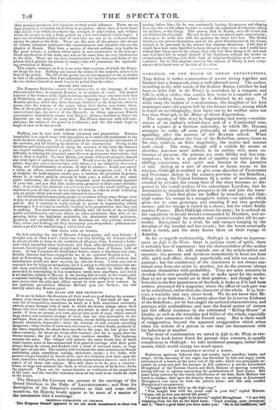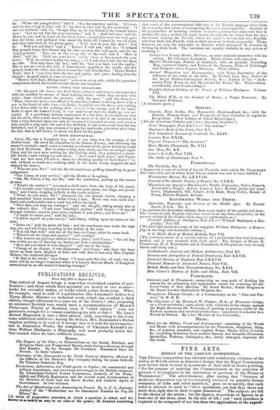OAKLEIGIL OR THE MINOR OF GREAT EXPECTATIONS.
THIS fiction is rather a succession of scenes strung together and hitched into a framework, than a well-planned novel. The author,
travelling in the wild woods of the frontier States, (whither he had
been to write Life in the West,) is overtaken by a tempest, and falls in with a settler, who carries him home to a superior sort of English-looking house, where he is detained by an ague. To while away the tedium of convalescence, the daughter of his host rummages some old papers left by the former owner ; among which is found an autobiography, that turns out to be neither more nor less than Oakleigh, or the Minor of Great Expectations.
The opening of this story is fragmentary and wordy—reminis- cences of an orphan's school-days, and of a Continental tour, with a sojourn at a German university, in which Mr. HoLmEs
attempts to strike off some philosophy at once profound and sparkling, after the manner of the BULWER school. When
young Oakleigh, about the time of the Rebellion, returns home to his only relation, an Irish singularity, the matter and manner both mend. The story, though still a vehicle for scenes or sketches, becomes more definite in its outline with more co- herence of put-pose; the persons are more lifelike and less com- monplace; there is a good deal of rapidity and variety in the shifting cosmorama, with spirit and interest in the narrative
or tale. Acting as a sort of steward or locum tenens to his relation, Oakleigh is enabled to give some sketches of Protestants
and Protestant doings in the country previous to the Rebellion; falling among the United Irishmen by a series of accidents, and arrested by mistake, the young hero of the story becomes so dia., gusted by the brutal tyranny of the subordinate Loyalists, that he determines to abandon all his prospects in life and join the insur- rectionists. Their first plans are baffled by treachery; and Oak-, leigh makes his escape in a smuggler's cutter,—an episode which gives rise to some grotesque and amusing if not very probable scenes ; and the voyage is varied by a chase ; but the vessel finally reaches France. Here Oakleigh enters the army ; he is ordered on the expedition to invade Ireland commanded by Humbert, and ac- companies it through its marches and countermarches till its sur- render. Recognized by a rival, he only escapes hanging by the devotion of the heroine and her cousin ; but the lovers eventually reach a vessel, and the story leaves them on their voyage to America.
So far as regards workmanship, Oakleigh is rather an improve- ment on Life in the West; there is perhaps more of spirit, there
is certainly less of coarseness : but the characteristics of the author remain the same. He still reminds one of the article-writer and reporter : the persons and incidents immediately in hand are done with spirit and effect, though superficially and with too much ex- pansion; but the consistency of the characters is not always sus- tained even from one scene to another, nor do the persons always conduct themselves with probability. They are more attentive to develop their own peculiarities, and to make sport for the reader, than to act as men would act in their position : and though we be- lieve this is the first appearance of the book, it looks as if it had beck written piecemeal for a magazine, where the effect of each part was to be considered, rather than the character of the whole. It is, how-
ever, a readable and very clever book. We do not know that Mr.
Hotade9 is an Irishman ; it is pretty clear that he is not an Irishman of the Rebellion ; yet he has caught the national characteristics, and
portrays with vraisemblance and ease the brutal scenes of tcirture
and low official insolence in the celebrated " Riding-House" at Dublin, as well as the atrocities and follies of the rebels, especially during their connexion with the French army. Nor is there much of exaggeration, beyond the apparent exaggeration which arises when the actions of a person at one time are inconsistent with his behaviour at another.
The want of condensation we noted in Life in the West, as ren- dering the book better fitted for perusal than extracts, is equally conspicuous in Oakleigh: we take incidental passages, rather than scenes, which would occupy too much space.
AN ORANGEMAN BUYING A HORSE.
Rapturous applause followed this and sundry loyal 'speeches, toasts, and songs; till the harmony of the night was disturbed by loud and angry words, portentous of a brawl, at the lower end of the table, which was principally oc- cupied by yeomanry and fox-hunters in full costume; a certain Lieutenant Droughtnot of the Yeoman Guard, and Buck Mahone of sporting notoriety, having differed in opinion concerning the qualifications of their horses. But peace being restored by the timely interference of our host, Buck Mahone was heard to declare, that upon his veracity there was no speaking to Lieutenant Droughtuot ever since he took the priest's horde: and this sally recalled Droughtnot's complacency.
"I bought the horse fairly on the high-way." "You bought him with the penal code in your fiat," replied Mahone. "Come, tell us how you served the priest."
"I served him as he ought to be served," replied Droughtnot. "I met him returning from the fair en the black horse. 'Good evening, your reverencer' said I; 'that's a good beast you have under you.' 'lie is not indifferent,' said he. 'Where did you get him ? ' said I. 'Up the country,' said he. '1l1 war- rant he has a leap in him,' said I; try him at this wall by the road-side.' 'I am not inclined, said be, 'though they say he has followed the bounds before now.' 'Let me try him for your reverence,' said I. 'And welcome,' said he. Down he got, and up I got on the black horse ; leaped him over the wall, gave him the heels, and galloped him round the fields till I found he was all right, and then rode back to the priest again. Well, bow do you like him ? ' said he. 'Will you sell him 2' said I. 'Indeed I will not, said he ; 'I refused fifty pounds twice this blessed day for him; so cross the wall again, and let me
tegoing home.' 'You are at the wrong side of the wall,' said I. How is that? said he. 'hold out your hand,' said I, here is five pounds for your horse.' Well, he refused to take the moor) ; till I told him I had the law upon
my side. You may have the law,' said be, 'but you have not the equity.' But to put an end to this talk, I dismounted, ungirthed the saddle, put five pounds under the skirt, and threw it over the wall Into his face. 'There, Father Toole,' says I, you have both the law and equity, and plain dealing into the bargain : so good night to your reverence.'"
"Bravo! well done, Droughtnot 3 "echoed on every side ; while his quondam companions drank his health amidst cheers and laughter.
LIVING UNDER TETE SHILLELAEL
"In the good old times, the Irish king, princes, and thanes, corresponded with one another by means of their walktng•sticks, which they covered with nicks ; from which came the proverb, ' nick the post,'" said the Braucher. "Thus, when one prince was offended by another, instead of sitting down with a pen in his hand to write him a challenge, he pulled out his skene, and cutting a few fierce nicks in his walking-stick, sent it to his enemy, and if the latter broke it upon the bearer's head, it was understood that the challenge was ac- cepted. If a gentleman became enamoured of a fair lady, he straightway sent her his stick, with a hole bored through the heart of it, and if she returned it with a ring fastened upon one end, he became the happiest of men ; and when a lady carried a ring upon the end of her shillelah, it was understood that she was betrothed, and if any man presumed to pay her particular attention after that, the lady was at full liberty to break his head for his pains."
AN IRISH HIGHWAYMAN.
Casey, Sir, was a Loughrea boy, and at one time was the scourge of the Dublin road. He owed his education to the famous Freney, and following his master's example, eased many a country gentleman of his purse before he could say Jack Robinson. But to make a long story short, one fine moonlight night Casey and his men were waiting for the Galway mail, they perceived a vener- able family coach rolling towards them. Now stand back, boys," said Casey, "and see how soon I'll relieve these tea-drinking quality of their finery ! '- and, without as much as a walking-stick in his hand, Casey stepped out and stopped the horses. Who are you, Sir ? " said the fat old coachman, puffing himself up in great indignation.
"One Casey, at your service," said the Broth of Loughrea. "Oh, Mr. Cet sey, I beg my life," said the coachman, pulling up the horses at once.
"What's the matter ?" screamed a shrill voice from the body of the coach. "I'll trouble your ladyship to hand me out your purse, ear-rings, and jewel- lery," said Casey, stepping politely to the coach-window. "What do you want, Sir ? " screamed the old damsel within, clapping a bell-mouthed brass concern before Casey's face. Never was man more con- fused and confounded—not a word was left in his head.
"How dare you stop my carriage ? " said the old girl, taking steady aim at the robber's face. "I ask your ladyship's pardon,', said Casey ; "it was all through mistake : recover your arms, madam, if you please, and drive on."
"I ought to arrest you," said the lady. "I throw myself on your mercy," said Casey, falling upon his knees in the mire.
"Drive on," said the stout old lady : and the coachman soon made the nags step out, and left Casey kneeling in the middle of the road. "You did that well," said one of the boys to Casey, when he came back. "Where's all the rings and purses ? " said another.
"The women are growing soldiers in these parts," said Casey : "the old bag was within an ace of blowing my brains out with a blunderbuss." "How did you know it was charged ? " said one of the boys. "Charge or no charge, it was dangerous," said Casey : sod then the boys threw up their hats, laughed at him, and told him it was only Mrs. Captain Malone the bothered dowager.
"If ;hat is the truth," says Casey, "I must quit this line of road ; for my name will be no longer respected when it is known that the Broth of Loughrea surrendered to an old woman's hearing-trumpet."



























 Previous page
Previous page